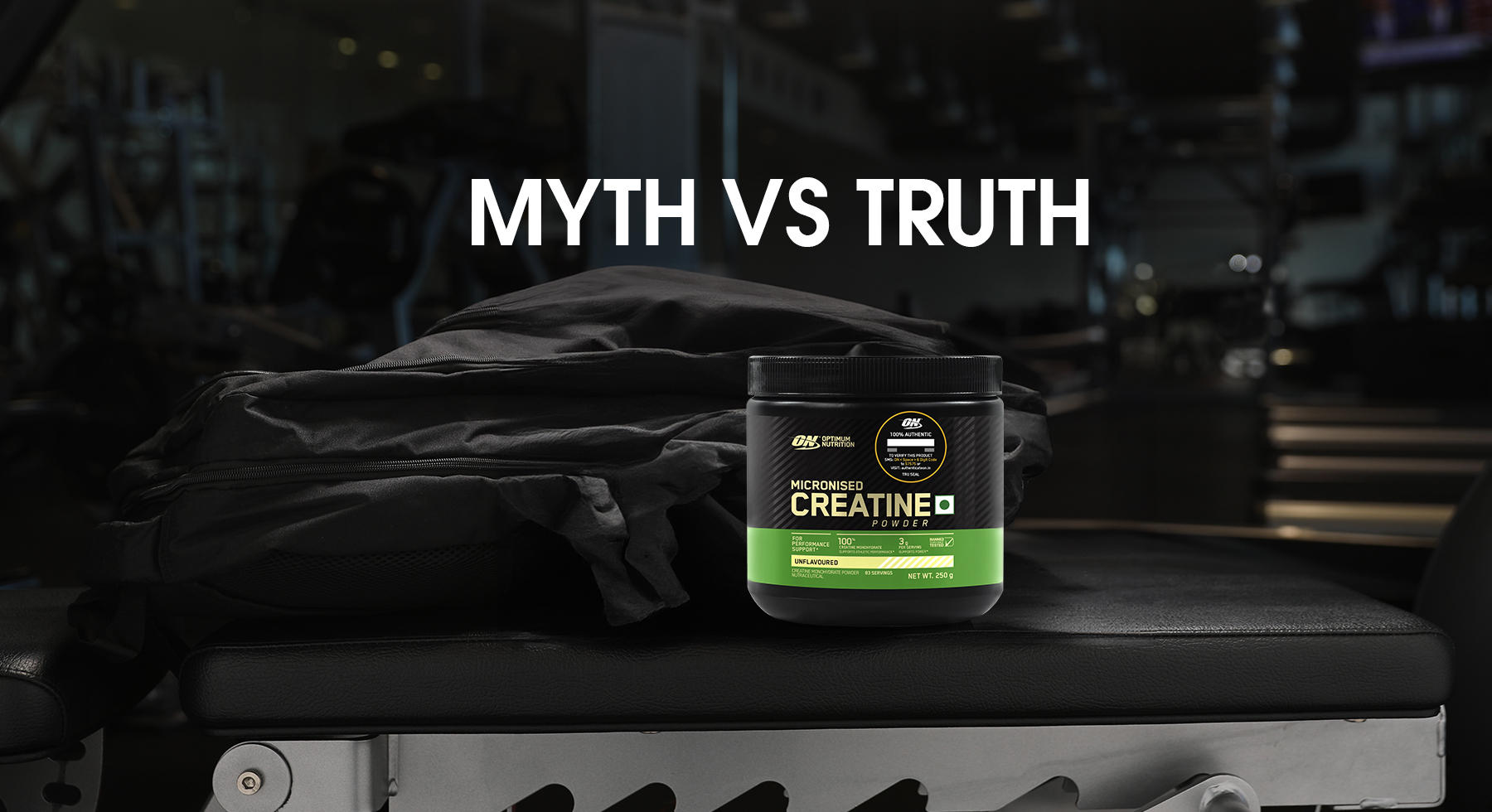
Creatine powder or to be more precise creatine monohydrate is a much-researched supplement with strong evidence to support its efficacy. There is a lot of misinformation around the topic of creatine supplement so let’s look at some of the most common misconceptions about creatine.
Most Common Creatine Myths
Myth 1: Creatine causes females to bulk up!
Firstly, bulking up can mean putting up muscle or muscle & weight. Now Creatine, protein, or any other supplement by itself cannot help females/males or anyone bulk up! If bulking up was so easy why would people workout and follow diet regiments? Actual muscle building requires a lot of dedication- high protein diet, resistance training, recovery plan and consistency to see visible results.
Why people associate creatine with bulking up because when taken consistently over time, creatine can help replenish muscle energy stores during short bursts of high-intensity activity. Creatine is stored in the muscles as Creatine Phosphate or Phosphocreatine (PCr). PCr is metabolised to release energy to contracting muscles during maximal effort, anaerobic activity. This energy system depletes very quickly during explosive or high intensity activity. Supplementing with creatine can replenish this energy supply which may lead to improved performance in explosive or repeated high intensity efforts.
In Short, creatine supplementation can help you DO MORE- more lifting, more sprinting, more reps, more jumping, more throwing…more of any high-intensity activity. And now you know that- (more weights/reps + protein + recovery)* time = Muscle Gain!
So, creatine (as part of the diet + training regimen) can help females gain muscle (if that is what they desire) … simply consuming creatine supplement will not make females bulk up.
Myth 2: Creatine Causes Bloating/Water retention-
The common form of creatine used in supplements is creatine monohydrate. Creatine monohydrate is basically creatine + water, it is a creatine molecule bound to a water molecule! Now if someone is taking 3-5 grams of creatine monohydrate daily it is highly unlikely that they will experience any bloating, however if they are going for loading protocol where one consumes extremely high amount of creatine (>16g) for up to a week some bloating might occur in come people. The response varies from person to person.
Now we already know that creatine loading is not necessary to see performance improvement. Thus, the chances of bloating can also be avoided by sticking to consuming 3-5 grams of creatine daily.
In short, creatine itself when taken in recommended dosage (India recommended dose is 3g/day) may not cause any bloating/water retention.
Myth 3: Creatine causes cramps
There is no credible/direct evidence proving that creatine supplementation causes cramps. Why cramps occur or how creatine might cause it, there are a lot of speculations around it- one most prominent one being creatine supplement increases muscle creatine stores -> changes in the intracellular osmotic pressure -> movement of water into the muscle cell -> coupled with dehydration due to sweat/heat/exercise related water loss -> less water outside the cells which affects thermoregulation and may cause cramps!
Again, all of this is a probable theory or speculation and never been proven.
Myth 4: Creatine causes dehydration
Same theory as above, creatine binds water inside muscle cells, etc. and causes cramping, dehydration, electrolyte imbalance- this according to the International Society of Sports Nutrition is a known myth!
Myth 5: Creatine is harmful for kidneys
Creatine supplementation when taken within guided amounts should not be a cause of concerns for healthy adults!
Body metabolizes creatine and the waste product of this is creatinine. Typically, in healthy individuals, much like any other metabolic waste, creatinine is also filtered and flushed out. This is done by Kidneys as it is the basic job of kidneys to filter blood and remove metabolic waste out of the body. When someone’s kidney function declines, one aspect of it is that the kidneys are not able to filter out the waste and it builds up in the blood. Do you see the fallacy? Of course, someone with already compromised kidney function would have adverse effects to creatine supplements as their body isn’t able to excrete its metabolic waste!
Take Home Message
Creatine is one of the most powerful and proven performance enhancing tool (ergogenic aid) that is out there. It is also one of the most researched sports nutrition ingredients. Typically, when taken by healthy adults and in the recommended amounts (3-5g/day), creatine supplement should be safe. In case of any allergic/adverse reaction, one must stop supplementation and consult with their doctor at the earliest.
Disclaimer:We do not claim our supplements to have any direct health effects. Supplements are never a sole source of nutrition and may only provide results when taken consistently over time along with a balanced diet and exercise regimen.
Optimum Nutrition products are not intended to diagnose, treat, cure, or prevent any disease. Our products are intended to be used by Healthy Adults. In case of any medical conditions, please always consult with your doctor or healthcare professional first.



